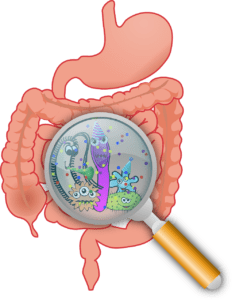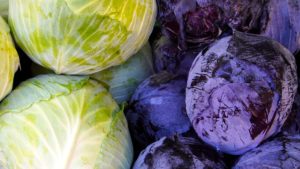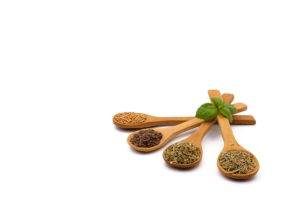Alleviating Flatulence: Useful Strategies
In a study, 96% of endometriosis patients reported occasional flatulence. Comparatively, only 65% of women without endometriosis did so. This indicates that over half of healthy women experience flatulence, while endometriosis patients encounter it 31% more frequently. Thus, flatulence emerges as a problem common issue affecting numerous. Now, what measures can be taken to address this concern?
Flatulence and Endometriosis

The phenomenon known as “Endo-Belly” is frequently accompanied by flatulence.
Bloating is common in women, particularly around the onset or just before their menstrual period. This sensation tends to be more pronounced among individuals with endometriosis patients, with some even describing it as the “endo-belly.” The abdomen becomes visibly distended, filled with air, and considerably larger than usual, leading to both physical discomfort and emotional distress for some.
The precise cause of this phenomenon remains elusive. It is assumed that inflammatory reactions caused by endometriosis in the abdomen lead to increased bloating. Importantly, this is not contingent on the location of endometriosis; thus endo-belly and increased flatulence may manifest even without bowel involvement. Conversely, some individuals experience endo-belly without reporting bloating.
Despite the correlation between bloating and other gastrointestinal issues in the context of endometriosis, it is crucial to explore alternative explanations. Certain conditions are often linked to endometriosis, while others are entirely unrelated.
Bloating, like many medical matters, is multifaceted. Conditions like endometriosis are just one factor in the equation, and a comprehensive approach against bloating should consider other influences and potential causes for an effective management plan.
Refining the Causes of Flatulence
Refining the Causes of Flatulence
 In simple terms, flatulence refers to “air in the belly”. Typically, the air accumulates in the large intestine. But how does it find its way there? Before addressing flatulence, it is crucial to identify the root cause. Endometriosis is often not the sole reason for the discomfort; various factors can contribute.
In simple terms, flatulence refers to “air in the belly”. Typically, the air accumulates in the large intestine. But how does it find its way there? Before addressing flatulence, it is crucial to identify the root cause. Endometriosis is often not the sole reason for the discomfort; various factors can contribute.
Additional factors and causes linked to flatulence include:
1. Eating too Quickly

Stress and hectic lifestyle can contribute to flatulence
The speed at which we eat plays a significant role; swallowing food hastily can introduce air into our digestive tract. Additionally, insufficient chewing before swallowing can be a contributing factor. Thus, not just the food itself but also our eating habits can lead to flatulence.
In the fast-paced modern lifestyle life, thorough chewing is often neglected. This results in inadequately chewed food entering the digestive tract. Often overlooked in this process is that thorough chewing initiates the breakdown of food into a soft mush, allowing for a sort of “pre-digestion” facilitated by saliva and its enzymes. When chewing is insufficient or hurried, this vital step is bypassed. The introduction of stress can compound the issue by leading to inadvertent air swallowing, a common source of discomfort.
While other factors might contribute to flatulence, taking time to chew food properly is crucial in preventing increased gas.
2. Food Intolerances

Ein Ernährungstagebuch ist ein wirksamer Begleiter.
Food intolerances, another contributor to flatulence, can be identified by maintaining a food diary. This diary notes the timing, type, and quantity of food consumed alongside the severity of subsequent flatulence or other digestive discomfort. Possible food intolerances encompass:
Celiac disease (sprue) / gluten intolerance
Fructose intolerance
Lactose intolerance
Milk protein allergy
This list is not exhaustive. Ultimately, only a medical professional can accurately diagnose and pinpoint specific food intolerances. Explore more about gluten in our insightful summary: Why a Gluten-Free Diet Can be Beneficial.
3. Imbalanced Intestinal Flora

A balanced intestinal flora supports digestion, boosts the immune system, and promotes psychological well-being.
Everyday factors like dietary changes, stress, or antibiotics can disrupt our intestinal flora and lead to an imbalance known as dysbiosis. This imbalance can sometimes result in bacterial overgrowth, affecting digestion and contributing to flatulence.
A shift in diet, such as incorporating more fiber through whole grains, fresh fruits, and vegetables, might also trigger sudden flatulence. The good news is that the intestinal flora adapts quickly to dietary changes, usually within a few days. If the issue does not stem from diet, you can support a healthy intestinal flora by consuming foods rich in beneficial probiotics, such as kefir, yogurt, sauerkraut, kimchi, and more.
4. Diet Products Containing Sugar Substitutes
Numerous “sugar-free” products on the market replace sugar with other sugar substitutes, which, when consumed excessively, can lead to flatulence and diarrhea. Warning labels against excessive consumption are often present on these products. Common substances include Sorbitol (E 420), Mannitol (E 421), Isomalt (E 953), Maltitol (E 965), Lactitol (E 966) and Xylitol (E 967).
It is advisable to steer clear of these substances and limit sugar intake generally.
5. Foods Known to Cause Flatulence

Cabbage is often not recommended for endometriosis due to various reasons.
“Beans, beans, the musical fruit; the more you eat, the more you toot” is a well-known saying. But why is that? Legumes are rich in healthy fiber. If your diet lacks fiber, your intestinal flora can struggle with these natural foods when suddenly introduced in large quantities. This reaction is not unique to legumes – it can also occur with whole grain products, fruits, and other vegetables.
On the other hand, pulses contain compounds that are difficult to digest. A simple solution is to discard the soaking and cooking water and the liquid from canned legumes. This removes a significant portion of these compounds before they contribute to flatulence. Other flatulent foods like onions or cabbage should also be approached cautiously. Cabbage is unfavorable for different reasons, too, especially in the context of endometriosis: Effectiveness of fruits and vegetables for endometriosis.
Cold soft drinks like cola and soda can also trigger or worsen bloating. The icy temperatures of these beverages can negatively impact certain digestive enzymes and disrupt the intestinal flora due to their high acidity combined with the cold. The carbonic acid in these drinks can also introduce additional air into the stomach, potentially leading to increased flatulence.
6. Unfavorable Food Combinations

Challenging digestion: fatty meat paired with greasy baked goods and rich sauces.
Eggs (and onions) contain sulfur compounds that lead to intestinal gas during digestion, which can become more pronounced when combined with fatty foods, potentially creating an “explosive” mixture. Generally, foods high in fat are harder to digest. Flatulence becomes likely when coupled with “flatulent” foods like meat, legumes, onions, cabbage, or eggs, along with poor eating habits that introduce air into the digestive tract.
Meat takes longer to digest than plant-based foods, and when combined with fat, it can result in a heavy feeling and a burden on intestinal bacteria. The digestion of fatty meat can contribute to flatulence. Similarly, pairing lean meat with fatty side accompaniments (such as French fries) can have the same effect! To find out why animal food is generally not recommended for endometriosis, refer to Vegan Diet for Endometriosis.
7. Medical Conditions Associated with Flatulence
If flatulence persists and is not attributed to eating habits and disturbed intestinal flora, it could indicate underlying conditions unrelated to endometriosis. Consulting a doctor is essential for proper diagnosis, as persistent flatulence might be linked to various treatable conditions, including:
- Gallbladder disorders
- Pancreatic issues
- Liver conditions
- Intestinal cancer
- Intestinal parasites
Furthermore, irritable bowel syndrome (IBS) can contribute to bloating, which is common among women with endometriosis. Discover effective strategies for managing irritable bowel syndrome alongside endometriosis in our article: Irritable Bowel Syndrome and Endometriosis.
What Helps Against Flatulence?

Changing your eating behavior can be highly effective in addressing digestive issues.
In most cases, flatulence is not caused by an illness but can be influenced by one’s eating habits – with or without endometriosis. However, even if the disease is the cause, it is worthwhile to improve eating behaviour and incorporate soothing foods/teas in daily life.
A change in eating behavior can bring significant improvements. Conducting individual tests to determine which foods trigger flatulence or endo-belly is essential. Keeping a diet and symptom diary can be helpful for this purpose.
Avoiding the mentioned foods or food combinations can be beneficial.
Additionally, there are various tips and tricks, both small and large, to prevent or alleviate flatulence when it occurs:
1. Using Spices and Medicinal Herbs to Combat Flatulence
Cooking legumes properly and using clever seasoning allows you to savor flatulent foods like beans, lentils, or cabbage without experiencing discomfort. Numerous spices have been traditionally paired with flatulent foods for improved digestion.

Viele Gewürze helfen, Blähungen vorzubeugen oder sie zu lindern.
Caraway/Cumin
Fennel seed
Anise
Peppermint
Lemon balm
Ginger
Preparing a strong tea or decoction from these kitchen ingredients can alleviate discomfort. Alternatively, a few drops of essential oils extracted from these spices can be added to a sugar cube and slowly dissolved in the mouth. It is vital to use only authentic essential oils, not synthetic fragrance oils, as only natural essential oils have an effect against flatulence!
In the case of caraway, anise and fennel seeds, you can draw back from the Indian tradition of the “mouthwash”: after a meal, a small portion (about one teaspoon) of seeds coated in colored sugar is served. While this primarily addresses bad breath after a garlic-rich meal, it also helps prevent flatulence resulting from the legume-rich Indian diet. Chewing a small portion of mixed fennel, caraway, or anise seeds thoroughly and slowly proves effective against flatulence – as a preventive measure and when it is already present.
2. Relaxation also Relaxes the Stomach

A walk relaxes and regulates digestion.
Bloating can trigger abdominal cramps and tension, and vice versa; tension can lead to digestive discomfort.
Relaxation techniques are crucial in regulating digestion to prevent bloating and releasing tension in the abdomen to alleviate flatulence.
These techniques include deep breathing exercises, mild stretching routines, gentle abdominal massages, and stress management practices that contribute to overall well-being. Engaging in moderate physical activity, like the well-known post-meal walk, benefits the mind and helps relax the stomach.
3. Exercise Helps against Flatulence
A digestive walk facilitates digestion, mainly promoting bowel movement, which can help minimize the occurrence of flatulence. Insufficient physical activity can lead to constipation, which can contribute to flatulence. This highlights the importance of incorporating more exercise into your daily routine.
Exercise holds advantages in various aspects related to endometriosis as well. Animal studies demonstrated that moderate to intense physical activity could potentially reduce the size of endometriosis lesions. Thus, the longer the digestive walk, the better!
4. Lefax and Similar Products

Over-the-counter remedies for flatulence often provide similar effectiveness to natural approaches, such as taking a digestive walk or using the home remedies mentioned above.
There are several over-the-counter medications available to alleviate flatulence. For instance, Lefax offers chewable tablets, while Sab Simplex provides drops as an alternative. These preparations typically have minimal side effects and can be helpful.
However, based on our experience, it is worth noting that these medications may not always yield significantly better results compared to natural remedies like fennel-anise-caraway tea and physical activity such as walking. Therefore, it is advisable not to have overly high expectations and instead focus on prevention.
Individual responses to these treatments vary, so each person needs to discover their personalized approach to managing flatulence.
Conclusion
Flatulence, unfortunately, often accompanies endometriosis. While the exact cause of this connection remains unclear, having a general understanding of flatulence can aid in alleviating the symptoms.
However, it is essential to note that serious diseases or food intolerances could be underlying factors behind flatulence, necessitating medical evaluation for persistent symptoms.
Nevertheless, unhealthy eating habits and the common occurrence of irritable bowel syndrome among endometriosis patients are frequent causes of flatulence. You can read more about irritable bowel syndrome and endometriosis here. Exploring individual reactions to specific foods is also relevant. Keeping a dietary and symptom diary can be beneficial in this regard.
Flatulence can often be effectively prevented by adopting a proper diet, engaging in regular exercise, managing stress, and embracing a healthy lifestyle. Should symptoms persist, natural remedies can provide relief.
Check out our Symptom Explorer, where you can find even more information about flatulence in endometriosis.
- Finding the Perfect Nutritionist: A Step-by-Step Guide - 5. October 2023
- Does Monk’s Pepper Help with Endometriosis? - 5. October 2023
- A Brief Overview of Dietary Fats - 29. September 2023
